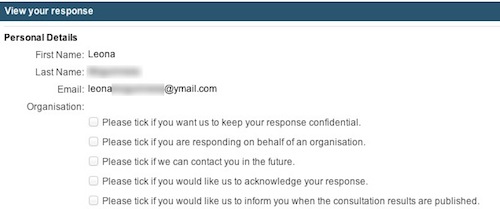Organisations will not have to abide by data protection laws if it would be too difficult, time-consuming and use up too many important resources to check whether information they hold is personally identifiable, the EU’s Council of Ministers has proposed.
The Council has outlined some revisions (112-page/575KB PDF) to the European Commission’s draft General Data Protection Regulation that was originally published in January. Under its proposals, published by information law experts Amberhawk Training, the Council has suggested amending the definition of ‘personal data’ as well as a recital outlining the scope of when the laws in Regulation would apply to information.

Both the revised definition and recital contain new proposals that would see information declared not personally identifiable if it was too burdensome to assess whether it actually is.
The proposed definition states:
‘Personal data’ means any information relating to an identified or identifiable natural person (‘data subject’); an identifiable person is one who can be identified, directly or indirectly, by means reasonably likely to be used by the controller or by any other natural or legal person, in particular by reference to a name, an identification number, location data, online identifier or to one or more factors specific to the physical, physiological, genetic, mental, economic, cultural or social identity of that person. If identification requires a disproportionate amount of time, effort or material resources the natural living person shall not be considered identifiable.
The scope of data protection should only apply to “information concerning an identified or identifiable natural person” and “account should be taken of all the means reasonably likely to be used either by the controller or by any other person to identify the individual, unless this would involve a disproportionate effort in terms of time or technical or financial resources,” according to the Council’s proposed recital.
Market researchers, online ad firms won’t benefit
Information law expert, Marc Dautlich of Pinsent Masons, the law firm behind Out-Law.com, said that the proposed amendments do not adequately assist industries whose focus is research and those whose business models are not really focused on the individual.
“Market research companies and academic organisations which really aren’t focused on the individual but on research and, perhaps more controversially, the online advertising industry struggle with this binary distinction between personal and non-personal data,” said Dautlich. “So-called indirectly identifiable data manifests itself online in IP addresses, in cookies and in other forms and it is difficult to follow how in practice this disproportionate effort test would help alleviate the problem.”
Anonymised information that does not allow individuals to be identified and information about dead people should be outside the scope of the data protection law, the Council proposed.
The UK had failed with a suggestion to limit the application of data protection laws under the Regulation to circumstances where a person is “easily identifiable”, the Council’s draft revisions document said.
The European Commission’s draft General Data Protection Regulation was one of two legislative texts the Commission proposed and, if enforced, would introduce a single data protection law across all 27 EU member states. Companies that process personal data of EU citizens from outside the borders of the trading bloc would also be subject to the rules.
However, the presidency of the Council of Ministers detailed proposed revisions to the recitals and first ten articles of the draft Regulation following comments by individual EU member states. The revisions document sets out that there is opposition to the formation of a Regulation at all by some countries in the trading bloc. However, the terms of the Regulation were also heavily contested and resulted in proposals to alter the rules around consent to personal data processing.
Under existing EU data protection laws, and the original draft reforms, obtaining consent from individuals is one way for organisations to obtain a lawful ground to process personal information.
Under the planned reforms organisations operating in the EU would generally have to obtain explicit, freely given, specific and informed consent from individuals in order to be able to lawfully process their personal data, while that consent will not be able to be gleaned through silence or inactivity on the part of individuals. Instead it would have to be obtained through a statement or “clear affirmative action” before it can be said to have been given.
However, the Council reported that some EU member states, including the UK, had raised concerns that requiring consent to be explicit, freely given, specific and informed was “unrealistic” and had “queried its added value.”
Consent can be ‘implied’
Germany had wanted “conditions for electronic consent” to be set out in the text, while the Czech Republic said consent should only be said to have been given if it was “provable” rather than “explicitly” given. However, the European Commission said the Czech Republic’s suggestion did not account for the possibility that consent can be implied and said that there were already provisions in the Regulation to ensure that “consent should not be unnecessarily disruptive to the use of the service for which it is provided.”
Under the Council of Ministers’ plans the “burden of proof” will be on the data controlling organisation to show that they have achieved legitimate consent to processing. The UK said this proposed rule would “put a heavy regulatory burden on companies.” The plans also account for the rights of individuals to withdraw their consent at any time, but revisions have been proposed which state that the withdrawal does not affect the lawfulness of processing based on consent prior to the withdrawal and that “nor shall it affect the lawfulness of processing of data based on other grounds.”
The Council also outlined plans to expand on the number of lawful grounds that can be relied upon to justify personal data processing as an alternative to obtaining consent. Among the proposals are plans to expand on the right of data controllers to process personal data if their “legitimate interests” do not outweigh the fundamental rights of individuals concerned. Under the Council’s draft revisions, the “legitimate interests” of third parties could also be considered as grounds to justify personal data processing where to do so would not interfere with the fundamental rights of individuals.
Further proposed expansions to the lawful grounds for personal data processing include in select circumstances relating to sensitive information and where the processing is necessary to comply with freedom of expression rights, in an employment context or for historical, statistical and scientific purposes, among others.
Revisions have also been suggested to enable personal data that is collected for a “specified, explicit and legitimate purposes” to be further processed “for historical, statistical or scientific purposes” subject to certain “conditions and safeguards” contained in the draft Regulation. Those conditions require, among other things, that the processing only go ahead if the purposes cannot be achieved by processing anonymised data instead and generally that data attributable to individuals is kept separate from “other information”.
The Council of Ministers’ document also detailed views on the application of data protection laws to information posted on social networks. The Commission’s draft Regulation contains a particular provision that exempts the rules laid out in the text from applying to “the processing of personal data … by a natural person without any gainful interest in the course of its own exclusively personal or household activity”.
The Commission said that this ‘household exemption’ should apply to social network users unless they set their privacy settings to ‘public’ “ie, when personal data are available … to an unrestricted number of individuals and not only to a limited audience at large.” The UK had also argued that “selling personal possessions on an auction site” should also fall under the exemption.
 Copyright © 2012, Out-Law.com
Copyright © 2012, Out-Law.com
Out-Law.com is part of international law firm Pinsent Masons.
Article source: http://go.theregister.com/feed/www.theregister.co.uk/2012/06/28/council_of_ministers_personal_data/

